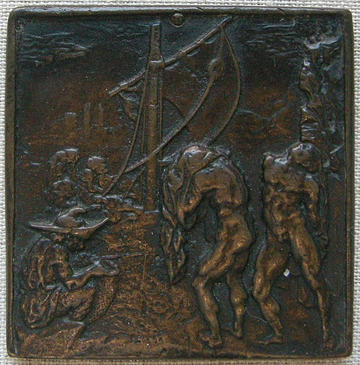Oeconomics Workshops
The legally uncertain status of the seas in the early modern global imagination was the focus of two workshops held at Merton College on Wednesday 24 and Thursday 25 May 2023. Organised by Anne Enderwitz (Humboldt) and Lorna Hutson (Oxford) as part of the Oxford-Berlin partnership, these workshops examined four primary texts relating to marine navigation, storms, shipwrecks, and human trafficking: Plautus’s Rudens or The Rope; Shakespeare’s Pericles; Hugo Grotius’s Mare Liberum or The Free Sea (tr. Richard Hakluyt) and John Selden’s Mare Clausum or The Dominion, or Ownership of the Sea (tr. Marchamont Nedham).
Workshop one, entitled 'Cultural Cargo: Ancient Slaveries', addressed slavery, the household and human trafficking via Plautus's comedy, Rudens or The Rope. Mary Nyquist (Toronto) kickstarted this workshop by introducing the group to the complex Greek predication of freedom in the ‘polis’ or state on slavery in the ‘oikos’ or household. Discussion of Plautus was framed by Susanne Wofford's (New York) pertinent question of how Rudens distinguished between different types of slavery — between those 'who ought to be free' (l. 394) and had been temporarily deprived of their liberty, those born into slavery who purchased their freedom, and those condemned to bondage seemingly in perpetuity. The fate of each of the play's slaves and their various conditions of autonomy raised a wider, stimulating discussion of what it means to be free.

Marble figure of a comic actor in the role of a slave seeking refuge at an altar. © The British Museum.
The significance of the play's surprising title attracted a gamut of rich and imaginative close readings; ropes were discussed as instruments of death (by hanging), bondage, and corporal punishment (used to deliberately scar or mark the skin) but also as common maritime tools, used for docking, anchoring, and rigging. The many scenes of arbitration in the play also proved generative for discussion as we considered the legal status of trunks and bodies pulled from the sea, and the claims to authority held by those who removed them.

Caradosso, scena della Gomena di Plauto, c. 1485.
Workshop two, suggestively entitled 'Chaste and Promiscuous Seas', first addressed seventeenth century debates over the ownership of the sea, before moving to Shakespeare's Pericles and to a discussion of the inherent risks in global seafaring and commerce. We began by discussing Hugo Grotius's Mare liberum (1609) and John Selden's Mare Clausum (1635), parsing their arguments of whether or not seas could be possessed, occupied or bound by limits. Discussion also touched upon Edmund Plowden's report of Sir John Constable's Case (1575); John Dee’s General and Rare Memorials of the Art of Navigation (1577); early modern instruments and scientific methods used to measure the seas and to quantify the bounds of dominion; as well as recent attempts to exploit New York City's zoning laws through upward expansion into the air.

John Dee, General and Rare Memorials Pertayning to the Perfect Arte of Navigation (1577). Frontispiece, detail.
We then proceeded to Shakespeare's Pericles and focused on three key scenes: the retrival of the eponymous prince's armour from the sea in act two, scene one; Marina's steadfast resistance to being prostituted throughout act four; and the comic reunion between Pericles and Marina in act five, scene one. The propitious recovery of Pericles's armour — 'part of [his] heritage' having been bequeathed to him by his father (2.1.119) — from the sea by three agreeable fisherman was compared to the protracted legal dispute over the ownership of the trunk pulled from the sea by the slave Gripus in Plautus' Rudens. This comparison threw up questions relating to the ethics of wealth-getting and the rights of fishermen to their catch. Could labouring upon and in the sea, we asked, constitute a claim to dominion?

Hugo Grotius, Mare Liberum. Lugduni Batavorum: ex officinâ Ludovici Elzevirij, 1609.
Finally, conversation about the recognition scenes in Pericles and Rudens promted a wider discussion of the complexities, risks and hazards inherent in engaging in oceanic commerce and international trade, writ large in the bodies of the women in Shakespeare's play. If seafaring was an especially promiscuous endeavour, our conversation concluded, then the challenge of those who navigated and traded upon the seas was to maintain something of their chastity.
As befits a CEMS Global Conversation, these workshops were attended by a wide range of Oxford students and Faculty from English, French, History and Art History, as well as Professor Anne Enderwitz, Humboldt University of Berlin and Professor Ladan Niayesh, Université de Paris. Thank you to the Oxford-Berlin Partnership and all who attended — particularly to Mary Nyquist and Susanne Wofford for persevering despite various technological hitches.
Report by



